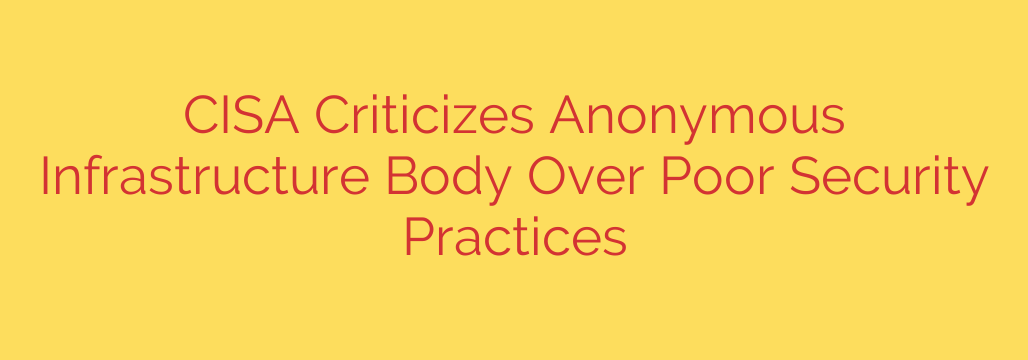
CISA Issues Stern Warning: Is Your Organization Making These Critical Cybersecurity Mistakes?
In a significant and highly unusual move, the U.S. Cybersecurity and Infrastructure Security Agency (CISA) has publicly rebuked a critical infrastructure organization for severe and persistent cybersecurity failings. While CISA did not name the entity, the public nature of the warning sends a clear and urgent message to businesses everywhere: fundamental security practices are no longer optional.
This rare public admonishment highlights a dangerous trend of negligence that puts not only the organization but also the public at risk. The core of CISA’s criticism revolves around the organization’s failure to address vulnerabilities responsibly, even after being repeatedly notified by security researchers.
Let’s break down the key security failures CISA flagged and what your organization must do to avoid making the same critical errors.
The Core Problem: No Way to Report a Fire
Imagine seeing smoke coming from a building but finding no fire alarm to pull and no 911 number to call. This is the digital equivalent of what happened here. The anonymous organization lacked one of the most essential components of a modern security strategy: a Vulnerability Disclosure Program (VDP).
A VDP is a formalized “see something, say something” policy for your digital assets. It provides a clear, safe, and legal channel for ethical hackers and security researchers to report vulnerabilities they discover. Without one, you are effectively blind to flaws that malicious actors are actively searching for.
By failing to provide this channel, the organization left researchers with no good options, forcing CISA to intervene.
CISA’s Key Criticisms and What They Mean for You
The public warning detailed several alarming security gaps. These are not complex, high-level oversights; they are failures in basic cybersecurity hygiene that every organization must address.
Ignoring Security Researchers
The organization reportedly ignored multiple attempts by security researchers to report a serious vulnerability. This is a massive red flag. Ethical hackers who take the time to find and report a flaw are offering free, invaluable security consulting. Ignoring them is not only disrespectful but also incredibly reckless. It’s like a doctor telling you about a serious health issue and you refusing to listen.Absence of a Vulnerability Disclosure Program (VDP)
This is the foundational error. Without a VDP, you send a hostile message to the security community. You create an environment where vulnerabilities are more likely to be ignored, sold on the dark web, or exploited than reported to you. A well-defined VDP builds trust and demonstrates that your organization takes security seriously.Failure to Implement Basic Cybersecurity Hygiene
The issues went beyond just the lack of a VDP. CISA’s involvement implies that the organization was also failing at the fundamentals. Basic hygiene includes practices like regularly patching systems, enforcing multi-factor authentication (MFA), managing access controls, and conducting routine security audits. These are the locks on your digital doors and windows—and they were left open.
Actionable Steps to Bolster Your Organization’s Security
This incident serves as a powerful wake-up call. Don’t wait for a public warning to get your house in order. Here are actionable steps you can take right now to strengthen your security posture.
Establish a Clear Vulnerability Disclosure Program (VDP): This is your top priority. Your VDP should clearly define the scope (what systems are included), provide a secure contact method (like a dedicated email address), and set expectations for communication. CISA offers a free VDP template on its website that can serve as an excellent starting point.
Foster a Culture of Security: Security is everyone’s responsibility, from the C-suite to the front lines. Treat security researchers as allies, not adversaries. When a vulnerability is reported, respond promptly, professionally, and transparently. Thank the researcher for their contribution and keep them updated on your progress.
Master the Fundamentals: Double down on cybersecurity hygiene. This is non-negotiable. Your immediate checklist should include:
- Enforcing Multi-Factor Authentication (MFA) across all critical systems.
- Implementing a robust patch management program to ensure software is always up to date.
- Adhering to the principle of least privilege, ensuring users only have access to the data they absolutely need.
- Conducting regular employee training to spot phishing attempts and other social engineering tactics.
The Bottom Line: Proactive Security is Non-Negotiable
CISA’s public intervention signals a new era of accountability. The days of treating cybersecurity as an afterthought are over, especially for organizations that underpin our daily lives.
This incident is more than a story about one company’s failures; it’s a cautionary tale for all. Malicious actors are constantly probing for weaknesses. By failing to implement basic defenses and rejecting help from those who find them, you are not just risking your data—you are inviting disaster. In today’s interconnected world, cybersecurity isn’t just an IT issue—it’s a core business responsibility.
Source: https://go.theregister.com/feed/www.theregister.com/2025/08/02/cisa_coast_guard_cni/








